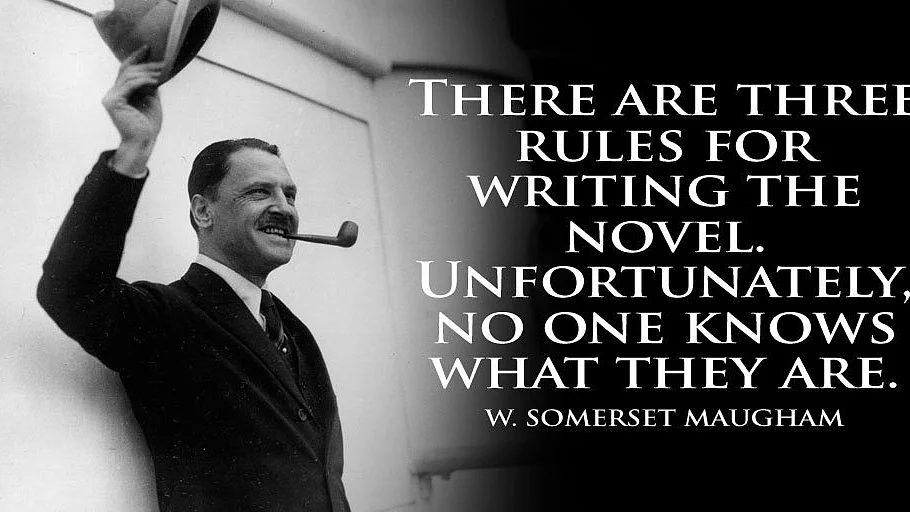Somerset Maugham in the times of Chetan Bhagat
Both Chetan Bhagat and Somerset Maugham are simple to read but Maugham’s simplicity carries a profundity which is often absent from the popular works of English fiction in India

You must know someone who reads Chetan Bhagat’s books. If you ask them they’ll tell you that they find the books simple to understand. In fact, many to most bestsellers today are written in the Chetan Bhagat mould. They are about love, heartbreak, sex, patriotism, small town life vs big city life… one can safely surmise that they are simple to read. They don’t use big words.
Let me take you to another writer, from Britain, who was known for his simple writing and who, like Chetan, earned big money (much more). So much so that he was probably the highest paid English writer in the 30s and later had a place in South of France – visited by Prime Ministers and famous poets and writers.
Like Chetan, Somerset Maugham borrowed from his life to fill the pages of his stories, plays and novels. He lived a life of riches, fame, some scandal, and unhappiness. Today, not many know of him.
His books are not prominent in universities. A college librarian had to search for ‘some copy lying somewhere’ when I asked for it. The popular bookstore Crossword took time to find him.
Surprising when you consider that this is also the man who inspired other ‘simple’ writers like Graham Greene and Ian Fleming (‘James Bond’ author). Shouldn’t he be a big name in India and internationally, if readers are buying books that contain easy sentences and simple words? Why then did journalist Tania Kindersley (The Guardian) hope in 2007 that he will make a comeback (when Chetan’s popularity was tremendous in India)?
While he naturally can’t be as popular as Chetan in India, I think lovers of Chetan’s books will not give him patronage. I’ll point out the reason. It is this – we want simple, but we don’t want too much depth. We want to quickly consume a tasty dish, and not really savour the flavours. The owner of a respected publishing house tells me – the new readers of English books in India want to be fed emotions. They don’t want to think too much, even in a murder mystery. Simplicity, alone, doesn’t make the cut.
Maugham wrote simple, but he often made you ponder about the human condition, about happiness and morality. You can read him ‘fast’ but you’ll need to stop now and then to ponder about what he says, until you get fed up of the process and read instead an easy book. An instance below will illustrate this.
I gave a few pages of Maugham to avid Chetan Bhagat readers. One of them told me – it’s dry.
‘Love can be dry’, I countered
‘Love has to have passion’, he concluded.
This reader (as he admitted) is used to the tropes of Bollywood-ish love, which is loud, and in which the lover doesn’t sit alone in a dark room because of a heartbreak – he drinks and makes drunken errors or yells at God.
Whereas Maugham’s heartbroken lover will wake in the morning to a wretched feeling in the pit of his stomach, and think of himself a prisoner longing for freedom. The loudness would arise from his soul and he would be tormented for long, and think about subjects such as bondage, loneliness, youth… inviting you, the reader, to dwell on the same.
Let me draw some more on the difference in simplicity between Chetan and Maugham.
In one of the most remarkable stories I have read, a part of Maugham’s spy novel Ashenden, a British political ambassador regrets not marrying the woman he loved, but marrying one who was appropriate to his class and breed. Despite any scandal and slander, the ambassador wonders, isn’t it better to spend a few years in complete bliss with a lover than spend a respectable life full of boredom?
The thought of living care¬free and happy comes out in this line from the story:
‘I’m not sure if a man isn’t wiser to do what he wants very much to do and let the consequences take care of themselves.’
Of course, this is a pertinent thought for our generation - - many of us grapple with the same problem of marrying for love- - but we want the thought told to us straightforwardly, mega Bollywood style, without delving into nuances and details.
So, while Maugham, through a character’s life, generally tries to make an emotion available for study:
‘The great tragedy of life is not that men perish, but that they cease to love,’
Chetan might pointedly spell out the same emotion as is seen in this top-rated quote from Goodreads dot com:
‘Don’t quit. It will happen one day.’
And in my opinion, the new Indian reader, not accustomed to reading very many books before the advent of Chetan’s, wants to be told things.
He is in a hurry to zip past the traffic, to enjoy his money in a weekend foreign location, to be entertained in a club, to live a fast life.
He simply wants the books’ characters to connect to his life or those of people he knows. He is not into it for universality or nuances. Therefore, it’s not really a matter of simplicity. Both authors are simple to read, surely, though only one of them will appeal to the consumer, in a hurry to whet his appetite.
Until one day the hunger will grow, and perhaps then Maugham and his ilk will enter the fray.
Follow us on: Facebook, Twitter, Google News, Instagram
Join our official telegram channel (@nationalherald) and stay updated with the latest headlines